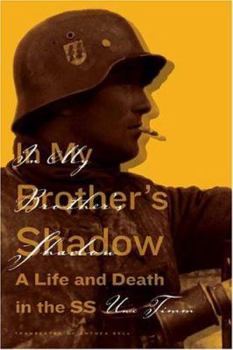In My Brother's Shadow: A Life and Death in the SS
Select Format
Select Condition 
Book Overview
A renowned German novelist's memoir of his brother, who joined the SS and was killed at the Russian front. Uwe Timm was only two years old when in 1942 his older brother, Karl Heinz, announced to his family he had volunteered for service with an elite squadron of the German army, the SS Totenkopf Division, also known as Death's Heads. Little more than a year later Karl Heinz was injured in battle at the Russian front, his legs amputated, and a few weeks after that he died in a military hospital. To their father, Karl Heinz's death only served to immortalize him as the courageous one, the obedient one, the one who upheld the family honor. His childhood was marked by the mythology of his brother's lost life; his absence-the hole he left in the family-just as palpable as if he were still alive. His mother's sadness and his father's rage over the loss of Karl Heinz ultimately defined Uwe's relationship with his parents. But while they eulogized the boy, Uwe wondered: who really had his brother been? The life and death of his older brother has haunted Uwe Timm for more than sixty years. His parents' silence was one of the most painful aspects of his family history. Not even after the war ended, and details of unspeakable horrors emerged, did his parents ever acknowledge Germany's guilt and Karl Heinz's role in it. They simply said: We didn't know. After the deaths of his parents and older sister Timm set out in search of answers. Using military reports, letters, family photos and cryptic entries from a diary his brother kept during the war, he began to piece together the picture, discovering his brother's story is not just that of one man, but the tragedy of an entire generation. In the Shadow of My Brother is a meditation on German history and guilt, one that is both nuanced and measured.
Format:Hardcover
Language:English
ISBN:0374103747
ISBN13:9780374103743
Release Date:January 2005
Publisher:Farrar Straus Giroux
Length:150 Pages
Weight:0.71 lbs.
Dimensions:0.7" x 5.8" x 8.6"
Customer Reviews
3 ratings
In my brother's shadow
Published by Thriftbooks.com User , 15 years ago
Received in timely manner. Book in condition stated by seller. Absolutely fascinating read!
history, memory, guilt
Published by Thriftbooks.com User , 19 years ago
This is less an account of Uwe Timm's brother's life and death in the SS -- though it is that -- than it is a reflection on memory and history, specifically on what they mean in postwar Germany. Timm's brother's diary, kept against regulations ("it ought not to exist," Timm writes), is brief and ambiguous. And in those ambiguities lie the greatest turmoil and conflict, with no real answers. What did the brother mean when he referred to a "big louse hunt"? Clearly, he was involved in criminal activities ("plenty of loot!"), and clearly, he was coarsened by the war ("fodder for my MG"). But was he involved in atrocities? Did he murder civilians? Those are the questions that Timm can't answer with any certainty. They point to the doubt and guilt of an entire people, a people who still struggle to come to terms with the war. Sixty years: still no answers, still no resolution.
great book
Published by Thriftbooks.com User , 19 years ago
I was born and raised in Germany. Even though my parents were born after the war and both my grandfathers were dead by the time I started asking questions I can still relate very well to the unease when it comes to talking about WWII. Where I grew up we had a neighbour whom I only knew as a mild mannered older guy, who loved us kids, would give us sweets and let us play in the big old trees in his garden. At one point I discovered that he was a member of the SS in WWII and had fought somewhere in Russia. He had no family. When he was in his eighties, he started opening up to a few people in the neighbourhood, among them my family. He would talk about the war, his comrades and generally the hard life they lived. He would always start crying. He would never mention fighting, killing civilians and all the other things he most likely saw and did. We all knew about those things, but we also felt sorry for the old guy and nobody pressed questions. He was a neighbour, not close family after all. Timm's book perfectly captures the conflict of the - very normal - desire to love and admire a brother (father, uncle, grandfather, neighbour) while at the same time knowing that that person must have consciously participated in something unspeakably atrocious. Obviously there is no easy solution and that conflict is one that generations of Germans had to deal with after the war. It is impossible to excuse what happened, but it is equally impossible to condemn all these people around you who all might have participated to various degrees, and be it just by keeping silent.






